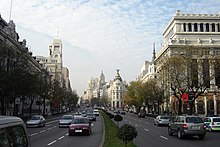Calle de Alcalá: Difference between revisions
m →Notable buildings: I remove Puerta de la Independencia because Buen Retiro Park is already included |
→Notable buildings: I remove Madrid Moderno because the residential community has virtually disappeared and it is not exactly in Calle de Alcalá |
||
| Line 65: | Line 65: | ||
*[[La Cruz de Malta]] |
*[[La Cruz de Malta]] |
||
*[[Las Ventas]] |
*[[Las Ventas]] |
||
*[[Madrid Moderno]] |
|||
*[[Ministry of Education (Spain)|Ministry of Education]] |
*[[Ministry of Education (Spain)|Ministry of Education]] |
||
*[[Palacio de Alcañices]] |
*[[Palacio de Alcañices]] |
||
Revision as of 22:06, 31 May 2022
 Calle de Alcalá with the Edificio Metrópolis, the Círculo de Bellas Artes and the La Unión y el Fénix Español building in the background | |
| Type | street |
|---|---|
| Length | 11 km (6.8 mi) |
| Location | Madrid, Spain |
| West end | Puerta del Sol |
| East end | Eisenhower Junction |
Calle de Alcalá is among the longest streets in Madrid. It starts at the Puerta del Sol and goes on for 11 km, to the northeastern outskirts of the city. Henry David Inglis described it in 1837 as "long, of superb width, and flanked by a splendid range of unequal buildings".[1]
History and landmarks

Calle de Alcalá is one of the oldest streets in the city. It was the old road which led to the city of Alcalá de Henares (from which it takes the name) and continued to Aragón; today, this route is covered by the A-2 motorway. Along this street it is possible to find landmarks such as Banco Bilbao Vizcaya at number 16, the former Alcalá 20 discothèque at number 20, Edificio Metrópolis, the Unión y el Fénix Español building at number 23, Círculo de Bellas Artes, Plaza de Cibeles, Puerta de Alcalá, the Spanish Ministry of Education, the Instituto Cervantes HQ building, the Bank of Spain building, Parque del Buen Retiro and Plaza de Toros de Las Ventas.
In popular culture
Por la calle de Alcalá was a popular cuplé describing a florist selling tuberoses on the street.
Notable buildings
- Teatro Alcázar
- Teatro Apolo
- Banco Bilbao Vizcaya
- Banco de España
- Banco Mercantil e Industrial de Madrid
- Buen Retiro Park
- Casino de Madrid
- Centro Comercial Alcalá Norte
- Círculo de Bellas Artes
- Convento de la Natividad y San José
- Edificio de Las Cariátides
- Edificio del Banco de España
- Edificio Metrópolis
- Estación de Banco de España
- Fonda Peninsulares
- Café de Fornos
- Convento de San Hermenegildo
- Casa de los Heros
- Four Seasons Hotel Madrid
- Iglesia de las Calatravas
- Iglesia de San José (Madrid)
- Iglesia de San Manuel y San Benito
- La Cruz de Malta
- Las Ventas
- Ministry of Education
- Palacio de Alcañices
- Palacio de Buenavista
- Palacio de Linares
- Palacio de Torrecilla
- Plaza de Cibeles
- Plaza de la Independencia
- Puerta de Alcalá
- Real Academia de Bellas Artes de San Fernando
- Real Casa de la Aduana
- Real Pósito de Madrid
- Café Suizo
References
External links
![]() Media related to Calle de Alcalá, Madrid at Wikimedia Commons
Media related to Calle de Alcalá, Madrid at Wikimedia Commons
